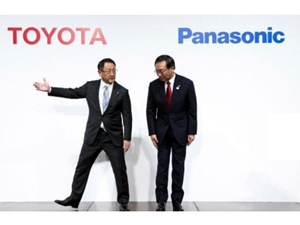



Date:21/01/19
 Toyota Motor Corp. and Panasonic Corp. are set to launch a joint venture in 2020 to manufacture batteries for electric vehicles in an effort to compete with Chinese rivals.
Toyota Motor Corp. and Panasonic Corp. are set to launch a joint venture in 2020 to manufacture batteries for electric vehicles in an effort to compete with Chinese rivals.
The joint venture, which may be announced next week, would have Toyota Motor Corp owning 51 percent and 49 percent by Panasonic Corp.
As part of the venture, Panasonic plans on shifting five of its automotive battery production facilities in Japan and China to the new company. The U.S. plant it operates in a partnership with Tesla is not included in the deal, reports the Nikkei Asian Review.
The new company could also provide batteries to Toyota’s EV technology partners Mazda Corp and Subaru Corp, a source familiar with the matter said on Sunday.
This latest venture builds on a 2017 agreement between the two companies to develop batteries with higher energy density in a prismatic cell arrangement. They jointed invested in a Japanese company to develop batteries for hybrid vehicles. Toyota is expecting to sell one million electric and fuel cell vehicles by 2030.
Panasonic already makes prismatic batteries for Toyota, while it makes cylindrical batteries of a type similar to those used in laptops for Tesla at the Gigafactory in Nevada.
Toyota and Panasonic also have plans to develop next-generation batteries - something that will require enormous cash outlays and a significant amount of technical expertise. Projects will include high-capacity solid-state lithium batteries.
High-capacity batteries are needed for improving the range of EVs, and they are also safer than what we have now. The two companies had already explored this project as part of their 2017 partnership. Toyota has made a reputable name for itself globally because of the fuel efficiency of its vehicles, but it has lagged behind China and Volkswagen on EV production.
It's the EV batteries that are the biggest hurdle in Toyota achieving its production goals for the future, and this is one reason for the partnership with Panasonic. And for Panasonic, this is also a good investment that will lead to savings on investment costs and a broader customer network.
Toyota and Panasonic to build electric car batteries together
 Toyota Motor Corp. and Panasonic Corp. are set to launch a joint venture in 2020 to manufacture batteries for electric vehicles in an effort to compete with Chinese rivals.
Toyota Motor Corp. and Panasonic Corp. are set to launch a joint venture in 2020 to manufacture batteries for electric vehicles in an effort to compete with Chinese rivals.The joint venture, which may be announced next week, would have Toyota Motor Corp owning 51 percent and 49 percent by Panasonic Corp.
As part of the venture, Panasonic plans on shifting five of its automotive battery production facilities in Japan and China to the new company. The U.S. plant it operates in a partnership with Tesla is not included in the deal, reports the Nikkei Asian Review.
The new company could also provide batteries to Toyota’s EV technology partners Mazda Corp and Subaru Corp, a source familiar with the matter said on Sunday.
This latest venture builds on a 2017 agreement between the two companies to develop batteries with higher energy density in a prismatic cell arrangement. They jointed invested in a Japanese company to develop batteries for hybrid vehicles. Toyota is expecting to sell one million electric and fuel cell vehicles by 2030.
Panasonic already makes prismatic batteries for Toyota, while it makes cylindrical batteries of a type similar to those used in laptops for Tesla at the Gigafactory in Nevada.
Toyota and Panasonic also have plans to develop next-generation batteries - something that will require enormous cash outlays and a significant amount of technical expertise. Projects will include high-capacity solid-state lithium batteries.
High-capacity batteries are needed for improving the range of EVs, and they are also safer than what we have now. The two companies had already explored this project as part of their 2017 partnership. Toyota has made a reputable name for itself globally because of the fuel efficiency of its vehicles, but it has lagged behind China and Volkswagen on EV production.
It's the EV batteries that are the biggest hurdle in Toyota achieving its production goals for the future, and this is one reason for the partnership with Panasonic. And for Panasonic, this is also a good investment that will lead to savings on investment costs and a broader customer network.
Views: 359
©ictnews.az. All rights reserved.Similar news
- Azerbaijani project to monitor disease via mobile phones
- Innovative educational system to be improved under presidential decree
- NTRC prolongs license of two TV and radio organizations for 6 years
- Azerbaijan establishes e-registry for medicines
- Azerbaijani museum introduces e-guide
- Nar Mobile opens “Nar Dunyasi” sales and service center in Siyazan city
- International conference on custom electronic services held in Baku
- OIC secretary general to attend COMSTECH meeting in Baku
- Azerbaijan develops earthquake warning system
- New law to regulate transition to digital broadcasting in Azerbaijan
- Azerbaijani State Social Protection Fund introduces electronic digital signature
- Intellectual traffic management system in Baku to be commissioned in December
- Tax Ministry of Azerbaijan started receiving video-addresses
- World Bank recommends Azerbaijan to speed up e-service introduction in real estate
- Azerbaijan to shift to electronic registration of real estate





















